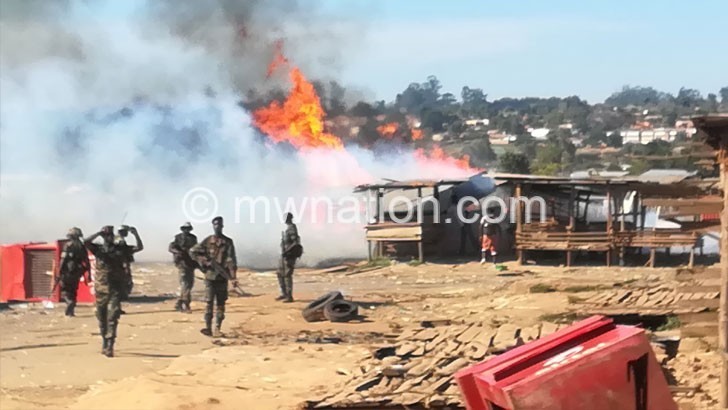Destructive demos in North, Centre stir debate
Traditional leaders, the clergy and political commentators have attributed violent demonstrations that have damaged public and private property, especially in the Central and Northern regions, as emanating from a feeling of marginalisation by the population.
While there have been sporadic cases of destruction during post-election protests in the Central and Southern regions, evidence shows that protests in the North have been too violent, leading to looting, destruction and razing down of private and public property.

During the series of demonstrations by Human Rights Defenders Coalition (HRDC) to push for the resignation of Malawi Electoral Commission (MEC) chairperson Jane Ansah and her team for allegedly presiding over a flawed electoral process in the May 21 2019 Tripartite Elections, private and government property in Mzuzu, Karonga and Chitipa has been razed down, a life lost in Karonga while others took advantage of the protests to loot from privately- owned shops such as Bata Shoe Company, Chipiku, Farmers World and Kulima Gold.
In the Central Region, destruction happened in Dedza, Salima and Mchinji. Police property, including a vehicle, was also torched while a police officer was stoned to death at Msundwe Trading Centre on the outskirts of Lilongwe City along the Lilongwe-Mchinji Road.

While condemning the acts in their entirety, there seem to be a consensus among religious leaders and political pundits that people in the Northern Region are too angry because they feel sidelined on development.
CCAP Livingstonia Synod general secretary the Reverend Levi Nyondo and Father Eugene Ng’oma of Mzuzu Diocese of the Catholic Church said people in the Northern Region have felt oppressed for a long time; hence, the violent conduct.
Nyondo, one of the fierce critics of the Democratic Progressive Party (DPP) regime, said people in the region have had the anger bottled up since independence in 1964 as they feel sidelined on development.
He said: “We see many violent protests. I must condemn such acts. We don’t condone them. However, you need to understand that since 1964, the region has been marginalised on development. So, people feel the only way is to be violent, which is not right.
“The challenge is that we have a government that does not listen to people’s challenges. It doesn’t share the national cake as expected, so people are saying enough is enough!”
Speaking during a mass at St. Peter’s Cathedral in Mzuzu earlier, Ng’oma faulted the protesters for destroying buildings which serve them, but said it is hard to control people who have felt oppressed for many years.
“Even when the demonstrations are branded peaceful, people will always turn violent because they feel it is time to vent it out. You can’t take a very angry person to go and do a peaceful activity… The North is not ready for peaceful demonstrations. I stand by what I say,” he said.
In a separate interview, Ernest Thindwa, a political analyst based at Chancellor College, a constituent college of the University of Malawi, observed that the violence normally results from failure to manage protesters when petitions have been delivered and lack of trust in the police system.
“The best is to make sure that the security apparatus stands in strategic places where violence is likely to take place, such issues can be avoided.
“Again, there is so much mistrust between the police and the citizenry. Police are now looked at as an apparatus of the ruling elite, so that leads to lawlessness. Trust has to be restored,” he said.
George Phiri of University of Livingstonia agreed with Thindwa, saying the current woes are a result of the malfunctioning of the police service and failure by government to provide development projects as expected by the citizenry.
But Paramount Chief Kyungu of Karonga and Chitipa said the country is at the mercy of politicians, specifically President Peter Mutharika of DPP, Lazarus Chakwera of Malawi Congress Party (MCP) and UTM Party’s Saulos Chilima.
In a telephone interview, the chief said: “Don’t ask me because this has nothing to do with chiefs. It has everything to do with politicians. It’s all about politics in this country, nothing about chiefs. So, if you want ask politicians Mutharika, Chakwera and Chilima.
“These three are principal players in the politics of this country. The country is in a mess because of them, so don’t ask traditional leaders, that’s my answer.”
Northern Region Police spokesperson Peter Kalaya said some people take advantage of the protests to advance their ill motives, essentially denting the whole essence of demonstrations.
“We have been arresting suspects and we continue to do so. So far we have secured two convictions for seven people who stole shoes from a Bata shop and eight people who stole bicycles from the ADD [agricultural development division] offices were convicted and given suspended sentences,” he said.
Ansah, a judge of the Malawi Supreme Court of Appeal, has dismissed calls for her to resign, saying she would only step down if the court hearing an elections petition case found her leadership to have failed to discharge its duties.
MEC declared Mutharika winner of the presidential race with 1 940 709 votes or 38.57 percent. He was trailed by Chakwera with 1 781 740 votes (35.41 percent) while Chilima came third with 1 018 369 votes or 20.24 percent ahead of four other hopefuls.





